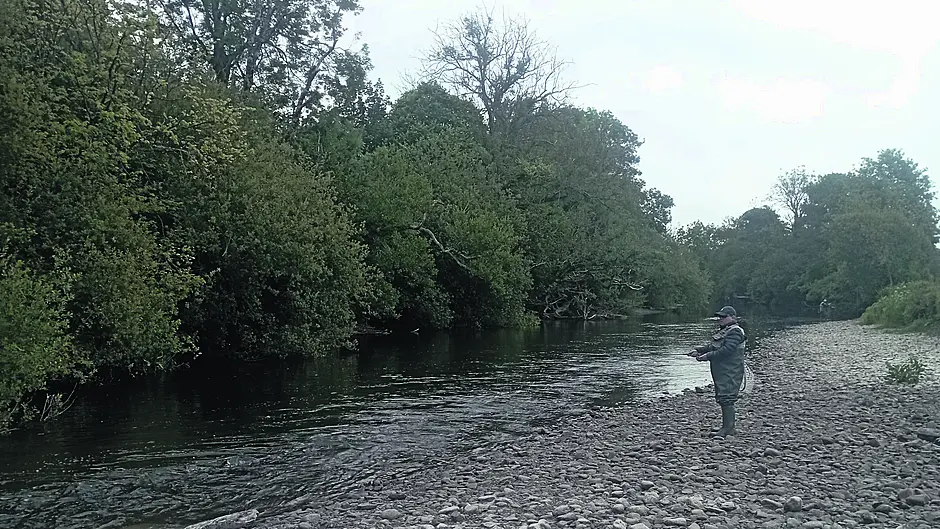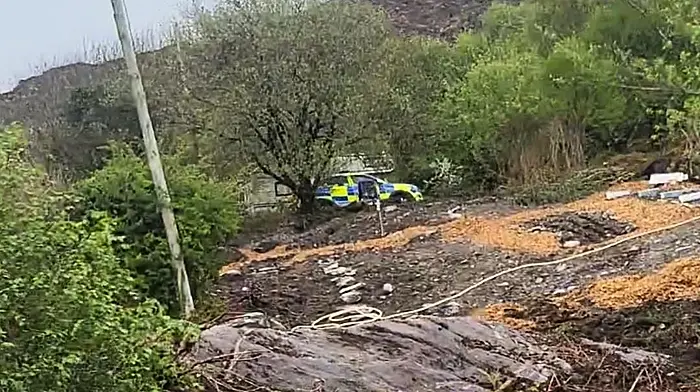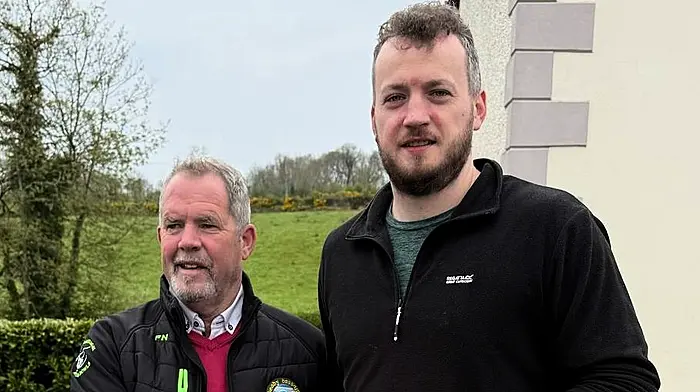Following work on Bandon’s flood relief scheme, the level of water on the river is now dangerously low for wildlife, according to the local fishing community
FRUSTRATED anglers are calling for Inland Fisheries Ireland (IFI) to fix the controversial fish pass on the Bandon river and to examine the low level of the water, which they say is threatening wildlife.
Speaking to The Southern Star, local angler Simon Toussifar said the fish pass, which was installed as part of the town’s €30.5m flood relief scheme, and is said to be the biggest in Europe, needs to be thoroughly re-examined.
‘We want both the OPW (Office of Public Works) and IFI to come back into the Bandon river and finish the job. We want them to green the area and fix the pass and also look at the whole issue of too much water going down below Bandon. It’s having a detrimental effect on wildlife and the river level west of the pass.’
‘That area has always been deep water but now it’s drying up. I think the people who designed the pass did not factor in extreme dry summers. What is happening now is that far too much water is being left through the pass, making the river section above Bandon lose too much water.’
Simon said that boulders were installed in the fish pass as a temporary fix in 2021, because fish weren’t able to travel through for three months after winter floods dislodged the stepped boulders. He now wants the OPW and the IFI to fix this temporary solution.
He and fellow angler Dan Holland are also calling for the addition of a sluice gate to help hold back water during severe dry spells and avert fish kills.
Cork South West TD and Social Democrats leader Deputy Holly Cairns raised the issue in the Dáil, asking when it is intended to replace these temporary boulders with a permanent structure.
Minister for Public Expenditure Paschal Donohoe said a number of minor works to address elements identified during construction, outside the main construction contract, remain to be completed and are being progressed in separate work packages.
‘In March 2021, the OPW became aware that the boulders, rock and gravel material that formed the bed of the fish pass ramp had deteriorated. Emergency works were carried out to solve the immediate problem with further temporary repair works being carried out in September 2022 to ensure fish passage is not impacted,’ he said.
‘The OPW will now commence work to procure an independent consultant to advise on any future works required for the fish pass, including if the current boulders need to be replaced.’ No estimate of costs can be given until the advice is available.
The fish pass was also raised by Cllr Sean O’Donovan (FF) at a recent meeting of Bandon Kinsale Municipal District, who said he was contacted by a number of fishing clubs about the river being so dry.
‘IFI put in a temporary solution for migrating fish at the pass, but it is draining the river on the other side. The river is very dry and it will have consequences for the freshwater pearl mussel and other fish,’ said Cllr O’Donovan, who requested they write to the IFI.
A spokesperson for IFI said they are aware of concerns regarding the river and specifically the area upstream of the pass in relation to low water.
‘Data from the OPW water gauge at the Curranure Station (Innishannon) records that the water level has been below average since mid-May and has only slightly increased since June 21st. These conditions are not unique to the Bandon river and are being replicated across the country.’
The spokesperson added that they are satisfied that the fish pass at Bandon weir, constructed as part of the Bandon flood relief scheme, is performing as intended, which is to remove the barrier to the upstream migration of Lamprey species and the impediment of salmon.
‘The fish pass allows for greater fish movement in extreme conditions. The instream area immediately upstream of the fish pass – known locally as ‘the bogs’ – formed part of the area unnaturally impounded by the old weir prior to the construction of the new fish pass.’
As a consequence of the completion of the fish pass, water levels in the impounded area reduced as the river returned to its natural state. ‘However, a constant flow has been maintained throughout the fish pass,’ they added.
IFI said that the addition of a sluice at the fish pass would serve only to re-impound the river and reduce the flow downstream of the weir.
However, Mr Toussifar called on IFI to revise the design of the pass with a view to keeping the water back. He said that towards an area known as ‘Jeffer’s Hole’ the river has completely shrunk, and is now ‘like a desert’.
‘There should be wildlife and you should have trout and salmon, but the river is getting smaller and smaller. This is directly as a consequence of the fish pass and I’ve never seen it so low,’ said Mr Holland.
Previously, Dr William O’Connor, a chartered environmentalist with Ecofact, called for the fish pass to be taken out, describing it as a badly-designed ‘eyesore’. He told The Southern Star at the time that the river will never be able to recover from the impact of dredging and the installation of extreme rock armouring, while he predicted fish passage problems would be another likely impact.










